

About the Author
Latest posts.

SBP Internship Program for Students at State Bank of Pakistan

Oral Presentation | Strategies to Deliver Successfully

Paid ADB Internship Program 2024 by Asian Development Bank
The huntsman poem by edward lowbury main idea, explanation, questions.

The Huntsman Poem by Edward Lowbury
About the poet | edward lowbury.
During his long poetic career, he published seven commercial collections. His fame mainly depends upon his unique use of humor, irony, paradoxes, and satire. Between 1936-85, Lowbury published seven collections and shared them in
two joint collections.
In the last part of his career, Lowbury had delivered many lectures on literary themes to learned societies; these were finally collected, along with a few essays, in Hallmarks of Poetry (University of Salzburg, 1994). He died in 2007.
Main Idea | Theme of Poem | The Huntsman
The Huntsman is an interesting poem based on African folklore. It is a story of a huntsman Kagwa. He used to hunt lions in the forest. One day, while he was hunting, he saw a talking skull of a man. He asked the skull, how did
he come there.
Secondly, we should not speak too much. Thirdly, we should not make haste. Sometimes by our hasty nature, we become the victim of unexpected dangers. Edward Lowbury is a great English poet. He is famous for his moralistic
Text and Explanation of the poem
Kagwa hunted the lion.
Through bush and forest went his spear.
One day he found the skull of a man
And said to it, “How did you come here”?
The skull opened its mouth and said
“Talking brought me here”.
Reference and Context
Explanation.
In these lines, the poet is narrating the tragic story of the African hunter Kagwa. Kagwa was a brave hunter. He used to hunt lions in the forest with a sword and spear. One day when he was strolling in the forest, he saw the skull of a dead man. He was, amazed to meet that skull.
He asked the skull, “How did you come here?” The skull opened its mouth and said, “Talking brought me here”. It was, in fact, a piece of advice for Kagwa that sometimes irresponsible and careless talking proves fatal. But Kagwa failed to understand the underlying
message of those words.
Kagwa hurried home;
Went to the King’s chair and spoke;
‘In the forest, I found a talking skull’
The king was silent. Then he said slowly
‘Never since I was born of my mother
Have I seen or heard of a skull which spoke’
Woods, jungle
Reference and Context
same as for the above passage
The king called out his quads.
‘Two of you go with him
And find the talking skull
But if his tale is a lie
And the skull speaks no word,
This Kagwa himself must die.
Same as for the above passage
They rode into the forest;
For days and nights, they found nothing
At last, they saw the skull; Kagwa
Said to it: how did you come here?
The skull said nothing. Kagwa implored,
But the skull said nothing.
Reference and Context
Same as for the above
The guards said ‘Knee down’
They killed him with a sword and spear.
Then the skull opened its mouth,
Huntsman, how did you come here?
And the dead man answered:
“Talking brought me here”
Kneel Bent position
Spear Pierce or thrust
In these lines, the poet concludes the tragic end of Kagwa’s story. When the skull
did not speak as per the order of the king, the guards promptly beheaded Kagwa. After his death, the skull opened its mouth and asked Kagwa how he had come there.
In much of your talking, thinking is half murdered
He who talks too much commits a sin”.
Important Questions and Answers
Question 3 .
As flies are to the wanton boys Are we to gods? They kill us for their sports
Shakespeare
Anila Ibrahim
An educationist, web content writer, equipped with an LLB and a Master’s degree in English Literature, as well as a Master of Philosophy in Entrepreneurship. I have a comprehensive understanding of both the English language and the educational landscape. This academic background empowers Anila to deliver content that is not only informative but also thoroughly researched.
12 thoughts on “ The Huntsman Poem by Edward Lowbury Main Idea, Explanation, Questions ”
What is meant by enlightenment? Mam g
Mam g what is meant by paradoxes.
Mam what is the meaning of futile.
Mam g what mean word underlying and futile and cautious mean??
Mam g what is meant under lying
Thanks mam g for this help 🙂🙂🙂🙂 you are a good teacher
Futile means useless, fruitless or hopeless.
Hmmm. I got the point for my critical essay for my exam. Bcs my teacher expects only critical thinking not renarration. So when I'm using my critical thinking, I can apply 2 or 3 lines which inspired me.Thanks
Its very nice and good I understand very well Thanks 😊 🙏
Leave a Reply Cancel reply
Your email address will not be published. Required fields are marked *
Save my name, email, and website in this browser for the next time I comment.

Technical Research Report | Significance and Sample
You may also like these.

Business Meetings and Group Meetings with Effective Strategies

Strategies for Successful Interpersonal Communication

The Huntsman by Edward Lowbury
Edward Lowbury’s “The Huntsman” is a ballad based on an African folktale. It follows the story of a huntsman named Kagwa who finds a talking skull and eventually ends up turning into one. Lowbury’s poems are known for their characteristic mystique and storytelling. The theme of this poem is “talking”- to be done when necessary and within a limit, as suggested by the poet. This piece deals with the uncertainty of human life and how short life is.
- Read the full text of “The Huntsman” below:
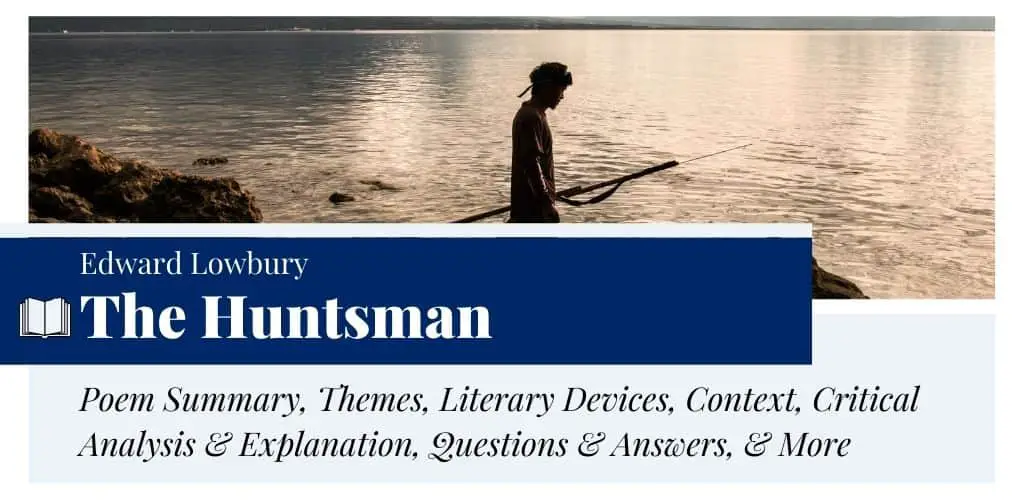
“The Huntsman” follows the story of a lion hunter, Kagwa. He is out hunting one day and comes across a skull. Upon asking the skull what it was doing there, the skull replies, “talking got me here.” Baffled by the discovery of the talking skull, the hunter goes to the king to report the incident. Naturally, the king does not believe him at first. Out of his curiosity, he orders two guards to go along with Kagwa in search of the talking skull. If the skull fails to speak, Kagwa will be sentenced to death.
This turns out to be true. When the hunter persistently begs the skull to speak, but there is no response, and eventually, Kagwa is killed. He becomes another talking skull who replies to the former skull’s query, “talking brought me here.”
The moral of this poem is that one should think and consider their audience before speaking. They should speak only if it is necessary.
Form, Rhyme Scheme, & Meter
“The Huntsman” is a ballad, a poem that narrates a story using short stanzas. The poem consists of five stanzas, with six lines each. It is written in the third person point of view, where Kagwa, the huntsman, is the main character.
The poem does not have a set rhyme scheme. There are occasional rhymings; for instance, in the first stanza, “lion” imperfectly rhymes with “man,” and “spear” rhymes with “here.” In some instances, Lowbury uses the exact words for the sake of rhyming.
There are five to seven words on average per line, and the poet has used line breaks and spacing to emphasize the scenes taking place in the poem. Besides, readers cannot find a regular metrical pattern in this poem. It mainly consists of the iambic meter with a number of variations.
Literary Devices & Poetic Techniques
Lowbury uses several poetic devices to achieve effortless storytelling. Readers can find the use of the following poetic techniques in “The Huntsman”:
- Personification: Lowbury describes the skull as “talking,” giving it human characteristics to emphasize the theme of the poem. In the line, “Through the bush and forest went his spear,” the narrator personifies the inanimate object, “spear.”
- Alliteration: The repetition of similar sounds in neighboring words can be found in “Kagwa h urried h ome,” “ f orest, I f ound,” “ s aid s lowly,” “ m y m other,” “ s kull which s poke,” etc.
- Consonance: It occurs in the lines, “ K agwa hurried home;/ Went to the k ing’s chair and spo k e:/ ‘In the forest, I found a tal ki ng s k ull.’/ The k ing was silent.”
- Allegory: The poem is based on the Nigerian folktale where a hunter becomes the hunted for foolish talking. Through this piece, Lowbury persuades readers to be more cautious of the words they speak and who they speak to.
- Irony: At the end of the poem, the hunter has the same fate as the “talking skull”—this showcases the situational irony of the human life that the speaker tries to shed light on.
- Symbolism: Being a lion hunter, Kagwa was a man of courage, fierceness, and strength. However, none of those attributes make up for his lack of wisdom and discretion. Here, “Kagwa” is a symbol of flawed human nature. A simple flaw can cause cracks in the overall human stature.
- Rhetorical Question: In the last stanza, the skull rhetorically asks, “Huntsman, how did you come here?” This line injects humor into this piece.
Stanza-by-Stanza Critical Analysis & Explanation
Kagwa hunted the lion, Through bush and forest went his spear. One day he found the skull of a man And said to it, ‘How did you come here?’ The skull opened its mouth and said, ‘Talking brought me here.’
Edward Lowbury sets a fierce and suspenseful mood at the beginning of “The Huntsman.” He paints a picture of a strong and courageous hunter who raves through the forest in search of the lion. Instead, he finds the skull of a dead man and unwittingly asks the skull how it ended up there. To his surprise, the skull answers vaguely, saying, “talking brought me here.” The poet uses personification to illustrate the skull’s mystery. It gives an overall eerie feel to the poem.
Kagwa hurried home; Went to the king’s chair and spoke: ‘In the forest, I found a talking skull.’ The king was silent. Then he said slowly, ‘Never since I was born of my mother Have I seen or heard of a skull which spoke.’
In this stanza, Kagwa is portrayed as a simple man who cannot keep things to himself. Without thinking of the consequences of his actions, Kagwa reports the incident to the king himself. He is not worried whether the King will believe him or not. The narrator tries to inform the readers about how impulsive decisions can lead to terrible outcomes by making the hunter take such a drastic step.
Stanza Three
The king called out his guards: ‘Two of you now go with him And find this talking skull; But if his tale is a lie And the skull speaks no word, This Kagwa himself must die.’
The tone of the poem slightly shifts in this verse. Lowbury’s focus is off from Kagwa and now on the king. The narrator draws upon the difference in their authority by showing how a simple truth can lead to a person’s entire life being taken in a snap. Naturally, the king does not believe the hunter but orders two guards to verify his story. This section shows how an absurd amount of importance given to one person’s statement can easily demean something as big as someone’s entire life. Besides, the huntsman’s life is as worthless as any of his subjects. It shows the typical nature of the kind.
Stanza Four
They rode into the forest; For days and nights, they found nothing. At last, they saw the skull; Kagwa Said to it, ‘How did you come here?’ The skull said nothing. Kagwa implored, But the skull said nothing.
The poet stretches out their quest for the skull to show how even truth can be challenging to find, and if it is found, it won’t necessarily convince anyone. In this verse, Kagwa is seen begging a skull for an answer, which from a reader’s perspective seems futile, as the guards see it, but to Kagwa, this one mistake would cost his entire life. The irony of this situation is that the skull that previously said, “talking brought me here.” Now it refuses to speak. This section shows how Kagwa failed to notice the skull’s implied message.
Stanza Five
The guards said, ‘Kneel down.’ They killed him with sword and spear. Then the skull opened its mouth; ‘Huntsman, how did you come here?’ And the dead man answered, ‘Talking brought me here.’
In the last verse of “The Huntsman,” the guards kill Kagwa with a “spear,” using which he set out to hunt a lion at the beginning of the poem. The dynamics of power continue onto this verse as the guards are seen following instructions as told, and Kagwa has accepted his fate. In the end, the skull asks Kagwa the same question, and the hunter’s response is “talking brought me here.” So, finally, he learns his lesson. In this way, Lowbury successfully illustrates the hazards of talking without thinking about what to say or whom to speak. Overall, the tone of the poem is humorous, suspenseful, and light-hearted.
The Ethics of Talking
Lowbury mentions the phrase “talking brought me here” twice in the entire poem. This emphasizes how speaking to the king is what brought Kagwa into trouble in the first place. Through this poem, Lowbury indirectly advises the readers to consider a few things before talking – to think about what you are going to say, to consider how you’ll phrase it, what tone will be used, and lastly, to think about who you are talking to. If Kagwa had revealed this secret of a “talking skull” to a friend or a fellow hunter, he probably would have been called a liar or made fun of. However, he would still be alive.
The massive difference in authority, the fact that a mere hunter knew something a king was not privy to, was what took Kagwa’s life. The implication of the last few lines, where the skull asks the hunter how he got there, and Kagwa reiterates, “talking brought me here.” This remark truly captures the theme of the poem.
The Turn of Fate
The poet reflects upon the idea of fate throughout the poem. Kagwa was the one to see the talking skull, and being someone of his nature, he told this to the King, which led to his demise. Lowbury paints the poem in a full circle, as Kagwa repeats the words of the talking skull, “Talking brought me here.” From the beginning, this might have been evitable for the strong and brave hunter, who eventually became the hunted for his mere foolishness.
The Dynamics of Power
Lowbury makes subtle and unhinged commentary on the absurdity of power dynamics throughout the poem. Firstly, Kagwa’s mistake was to think to inform the King himself as opposed to a friend or another hunter. Secondly, the king’s ego takes a hit when he realizes that Kagwa, the mere hunter, might have found something that he had never seen in his life. So, he ordered Kagwa’s death if his tale turned out to be a lie. Thirdly, the guards who followed Kagwa for days killed him without a second thought because it was an order directly from the king. Thus, Kagwa had to accept his fate. Though this is not the primary theme, subtle hints are made to this theme throughout the poem.
Historical Context
Edward Lowbury was an English poet born in 1913. He was a pioneering pathologist and medical bacteriologist who dedicated his life to medical research. Lowbury is known for his seven poetry collections that were published during his lifetime. Some of his most renowned collections are Selected and New Poems 1935-1989, Collected Poems (1993), and Mystic Bridge (1997). His poems are best known for their suspense, thrill, morals, humor, and paradoxes, as seen in the poem “The Huntsman.” This poem is based on Kenyan folklore, which Lowbury heard while he was posted to Kenya.
Questions and Answers
Edward Lowbury’s poem “The Huntsman” is about a hunter named Kagwa, who comes across a talking skull while hunting for a lion. He reports the striking incident to the king. Despite believing in Kagwa’s story, the king orders two guards to check it out. If his story were to come out to be false, he would be sentenced to death. Lowbury illustrates the implications of talking in this poem.
The idea of fate is subtly highlighted throughout the poem. Kagwa is the only one who finds the “talking skull.” In the end, his end is the same as the skull – as if it was inevitable. The strength, courage, and bravery that Kagwa had as an established lion hunter did not matter because he could not escape his death. His unwitting decision to disclose the incident to the king is what brought upon his downfall.
The poem is based on the African folktale where the “hunter” becomes the “hunted.” This piece sees the same end as Kagwa, the lion hunter, ends up like the talking skull because of his own wrong decision to inform the incident frivolously to the king. Overall, Kagwa was a man of courage, unmatchable strength, and agility, but he was not as smart as required in specific circumstances. He had not listened to reason or questioned the decision of telling the matter to the king. This led to his death and the same fate as the “talking skull.”
The main idea of this poem orbits around the ethics and implications of talking. Lowbury persuades readers to think before speaking and to consider their audience before talking. Otherwise, there would be implications that they cannot undo.
The tone of the poem is humorous, free-spirited, ironic, and sad. Lowbury injects humor in several instances. The overall tone shifts at the end, where Kagwa dies for his unwitting decision.
This poem is written in ballad form. A ballad is any poem or song that narrates a story through short stanzas. There is no specific rhyme scheme or meter in the poem. Besides, the poem is told from the perspective of a third-person narrator.
The literary devices used in this poem include personification, alliteration, irony, epigram, rhetorical question, etc. Each device makes the story more appealing to readers.
The moral of the poem is that we should think twice before talking. We should not act upon a single thought without heeding to reason and common sense.
Edward Lowbury makes use of poetic techniques such as irony, insinuation, and wordplay in order to create a humorous tale. His poem “The Huntsman” is all about a hunter named Kagwa who died for lack of common sense and mindless blabbering. The first instance where humor impregnates readers’ hearts is the line, “Talking brought me here.” Lowbury uses this line again in the last stanza to heighten the intensity of the laughter. Besides, the lines, “This Kagwa himself must die” and “The guards said, ‘Kneel down.’” contain an essence of dark humor.
Similar Poems with Life Lessons
- “ What is Life? ” by John Clare — This poem not only explores the meaning of life but also taps on its uncertainties.
- “ [little tree] ” by E. E. Cummings — It’s a sweet little tale of a tiny Christmas tree brought to the speaker’s house.
- “ Marrying the Hangman ” by Margaret Atwood — This darkly humorous tale is based on an actual event where two convicted decided to marry for the sake of saving their lives.
- “ Butter ” by Elizabeth Alexander — This poem humorously talks about how the poet’s mother applied butter to each food item she cooked.
External Resources
- About Folklore — Learn about the definition and different folklore genres from across the world.
- Profile of Edward Lowbury — Explore Lowbury’s profile on the National Center for Biotechnology Information’s website.
- About Edward Lowbury — Learn more about the poet’s life and medical career.
- Life & Works of Edward Lowbury — Explore more about the poet’s life and his literary works.
Share this:
At Poemotopia, we try to provide the best content that you can ever find. Each article is the fruit of a rigorous editorial process.
One Comment
Brilliantly explained without unnecessary commentary… If one is lost for words, one says, “No Comment!”
Leave a Reply Cancel reply
Your email address will not be published. Required fields are marked *
Save my name, email, and website in this browser for the next time I comment.
Notify me of follow-up comments by email.
Notify me of new posts by email.

The Huntsman - Edward Lowbury (1913-2007)
Kagwa hunted the lion, Through bush and forest went his spear. One day he found the skull of a man And said to it, ‘How did you come here?’ The skull opened its mouth and said, ‘Talking brought me here.’
Kagwa hurried home; Went to the king’s chair and spoke: ‘In the forest, I found a talking skull.’ The king was silent. Then he said slowly, ‘Never since I was born of my mother Have I seen or heard of a skull which spoke.’
The king called out his guards: ‘Two of you now go with him And find this talking skull; But if his tale is a lie And the skull speaks no word, This Kagwa himself must die.’
They rode into the forest; For days and nights, they found nothing. At last, they saw the skull; Kagwa Said to it, ‘How did you come here?’ The skull said nothing. Kagwa implored, But the skull said nothing.
The guards said, ‘Kneel down.’ They killed him with sword and spear. Then the skull opened its mouth; ‘Huntsman, how did you come here?’ And the dead man answered, ‘Talking brought me here.’
Common Misconceptions of the poem
The genre of the poem.
Is it a ballad?
No, The Huntsman by Edward Lowbury is not a ballad. A ballad is a narrative song that is orally passed down through generations. Now let us compare the differences and similarities between the characteristics of a ballad and the poem “The Huntsman.”
“The Huntsman” by Edward Lowbury is not a ballad by definition, but a poem that contains certain characteristics of a ballad.
Is there a rhyming scheme?
Yes. “The Huntsman,” of course, has a rhyming scheme. However, it is not the conventional style of a rhyming scheme, but a crafty one that only those with an open mind can see.
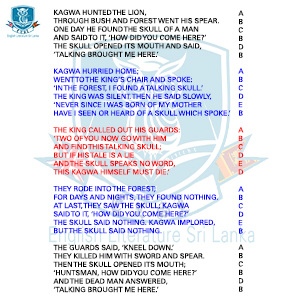
About The Poet
Edward Lowbury
Edward Joseph Lister Lowbury was a British poet and an expert on hospital infection who was assigned to the Royal Army Medical Corps and was posted to Kenya in 1943. While he was in East Africa, he took a particular interest in witch-doctoring and folk medicine.
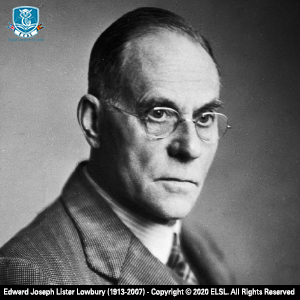
The Huntsman
- The poem is based on a Kenyan folk tale, and the poet adds significance to the subject, the huntsman with the usage of the definite article [The]
Kagwa hunted the lion,
- The name of the main character is a significant one. Even though the poem is written for a British audience, the name “Kagwa” immediately establishes the African setting in which the storyline takes place.
- The closest English translation of the East African name “Kagwa” is “fall”. It makes perfect sense that the entire literary work is about the fall of the mighty huntsman.
- The tense of the first verb, “hunted,” is simple past. It indicates that the action has no connection to the present period of time while establishing the third-person objective narrative style of the poem.
- Kagwa The hunter did not simply hunt a lion-he hunted “THE lion”. The crafty definite article emphasises the significance of the lion, which elevates the might of the hunter. Later in the poem, the elevated esteem of the hunter contributes significantly to generate a significant blow to the reader when he is unjustly murdered.
- Even though the reader finds a responsible political body later in the poem, it is Kagwa who arbitrates the threat of “the lion.” Little does he know, the have-a-go hero thus poses a political threat to the king.
Through bush and forest went his spear…

Through bush and forest went his spear.
- The “spear” is a symbol of Kagwa’s power
- “ bush and forest” metaphorically indicates the geographical span of Kagwa’s power-as “bush” refers to the nugatory and “forest” to the significant.
- The powerful throw of the spear, which made it traverse the “forest,” hyperbolically emphasises the physical strength and robustness of Kagwa.
- Moreover, the poet achieves the slow-motion effect by making the spear travel a longer distance. [Through the forest]
One day he found the skull of a man And said to it, ‘How did you come here?’
- “One day” indicates the narrative style of the poem.
- The tense still continues to be simple past. The absence of the connection to the present period of time eerily connects to the upcoming death of Kagwa.
- Even though ‘How did you come here?’ is a casual remark, it questions the emotional stability of the protagonist. Throughout the poem, the reader does not encounter any family or friends of Kagwa, and his efforts are neither recognised nor appreciated, instead being doubted. Thus, it is no surprise to see the socially and politically discriminated protagonist trying to talk to inanimate objects he randomly finds in the forest.
- The direct speech section of the line, “How did you come here?” functions as a dialogue, which enhances the liveliness of the poem and the timelessness of the figurative message conveyed.
- Note: “How did you come here?” is not a rhetorical question as it is immediately followed by an answer.
The skull opened its mouth and said, ‘Talking brought me here.’
- The reader has to wait till the next line to find out what is said by the skull. Lowbury is, of course, playing with the curiosity of the reader to keep him engaged.
- The inanimate object, “the skull,” that performs a deliberate action functions as a personification.
- The word “opened” contains a sense of movement, and it can be recognised as a kinesthetic image.
- Note the difference between the words “said” and “talking.” The word “say” is used to indicate the responsibility communicated by the skull. However, the word “talking” contains the idea of idle communication.
- “Here” is referred to as the state of being dead. Yet it seems like Kagwa, the hunter, is not sophisticated enough to understand the connoting message of the advice of the skull.
- “Talking” further suggests the idea of revealing confidential information. Later in the poem, the quick and inequitable decision of the king to murder Kagwa in his tale is a lie, figuratively questioning the sensitivity of the political leader towards Kagwa, finding evidence of a potential murder. Therefore, Lowbury connotes the idea of the dangers of being involved in corrupt political matters.
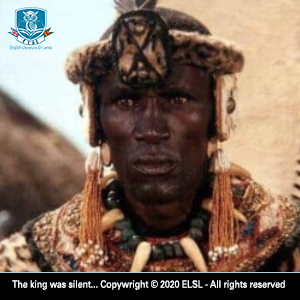
Kagwa hurried home;
- The stupefied nature of Kagwa is clearly revealed as he runs back home. The line gives the idea that the hunter may have a place to call “home” after all.
- ‘hurried’ is a kinesthetic verb which contains the sense of movement.
Went to the king’s chair and spoke:
- Simple Past continues to be the dominant tense of the stanza while indicating the third-person non-objective narrative style.
- Even though Kagwa “hurried home,” the reader immediately understands the superfluous connection he has to politics.
- In a different perspective, the reaction of Kagwa to inform the king of his extraordinary finding showcases his predilection towards being faithful to the ruler.
‘In the forest, I found a talking skull.’
- Note the apostrophe caused by the inverted syntax of the line. It indicates the unsophisticated nature of the hunter, Kagwa. Additionally, the emphasis of the sentence shifts from “in the forest” to “I found a talking skull” due to the use of the inversion.
- Even though the skull “said” it was talking that had brought it to the unfortunate outcome, the huntsman regarded it as a “talking skull.” Thus, it is evident by now to the reader that Kagwa has misunderstood the valuable advice of the skull.
- The speech pattern of the huntsman is extremely simple, and later it contrasts with the complex oral expression of the king.
The king was silent. Then he said slowly,
- The silence of the king can be interpreted in different perspectives. On the one hand, it indicates his intelligence, as he is not quick to jump to conclusions. It further expresses how the political leader distrusts the hunter who is regarded to pose a potential threat to his reign.
- The period (.) that interrupts the line is a caesura. It adds emphasis to the pensive reaction of the king.
- The slow-paced speech of the king starkly contrasts with the fast-talking of Kagwa, and the contrast stresses the intelligence-gap between Kagwa and the king.
‘Never since I was born of my mother Have I seen or heard of a skull which spoke.’
- Unlike Kagwa, who utters simple sentences, the king uses complex sentences to express his ideas. On the one hand, the complexity of the king’s speech exhibits his level of sophistication. On the other hand, it figuratively indicates his hostility towards the hunter who brought the news of the “talking skull.”
- The inverted syntax of the lines is a good example of the usage of the poetic device, anastrophe.
- Line five does not have a punctuation mark at its end, and the idea extends to line six. The poetic device is called enjambment. Enjambments generally increase the complexity of expressed ideas in poetry.
- The folktale of the “skull that spoke” is common in all of East Africa, and the nescience of the king figuratively indicates his high-and-mighty character as a political leader.
- The disbelief of the king in the irrational tale of the huntsman further reveals his non-credulous character.
The king called out his guards:
- The stanza continues to maintain the third-person objective narration.
- The poet again keeps the reader on his toes with the suppression of the immediate revelation of information as the decision of the king is revealed in the last line of the stanza.
‘Two of you now go with him And find this talking skull;
- Dialogues are again introduced into the stanza to increase the liveliness of the situation.
- The single-lined, simple sentences uttered by Kagwa continue to be contrasted with the complex speech patterns of the king. The complexity of the syntax of the king is highlighted through the continuous use of enjambments.
- Two guards and Kagwa create a group of three. Three as a digit is a general ominous symbol in English Literature, as well as in many communities that cling to superstitious beliefs.
- The tone of the king further emphasises his disbelief while questioning the involvement of military power in a “skull”. From a different angle, the behaviour of the king depicts a corrupt and punitive political leader.
But if his tale is a lie And the skull speaks no word, This Kagwa himself must die.’
- “But” indicates a sudden twist in the king’s opinion, making the third stanza the turning point of the poem.
- The king uses a conditional statement, and the present tense associated with it emphasises his hard and fast decision.
- The arbitrary punishment imposed upon Kagwa-indicates the primitive, brutal, and savagely cruel governance of the tribal setting of the poem. In a different perspective, “death” magnifies the harmful consequence of “talking”—which is the primary purpose of the poet.
- The enmity of the king towards the hunter further sets a secondary theme for the poem; the dangers of involving politics in one’s personal life.
They rode into the forest;
- The sense of movement found in the second stanza re-appears with the word “rode.”
- The simple past remains as the stanza’s dominant tense.
- The word “they” refers to the hunter and the two royal guards. The ominous symbol of number three still haunts the poem, smacking on the idea of an upcoming tragedy.
For days and nights, they found nothing.
- Unlike in the previous stanzas, this one contains an increased number of caesurae. They immediately indicate the tension associated with the ongoing situation.
- The poet adds emphasis to negativity through anastrophe.
At last, they saw the skull; Kagwa Said to it, ‘How did you come here?’
- The poet reveals the crux associated with the stanza at the very end of it, and he continues to build up the suspense of the reader by not immediately revealing the conclusion.
- The confusion of Kagwa is highlighted as he still believes that the skull spoke to him earlier. His inability to distinguish between reality and fantasy functions to be a fatal flaw in his character.
- Line four contains another dialogue of the hunter and as usual, it elevates the dramatic quality and the timelessness associated with the context of the poem.
- Note: Even though there is no answer provided to the question asked by Kagwa, it is still not regarded as a rhetorical question.
The skull said nothing. Kagwa implored, But the skull said nothing.
- “Skull said nothing” is a repetition, and it suggests the upcoming, inevitable tragedy.
- The powerlessness of the mighty huntsman in front of material [the skull] is ironical. Even though it literally forms humor, the sensitive reader can still feel the helplessness of the hunter who is struggling to distinguish reality from fiction.
- The reader is by now well aware of the fact that Kagwa is an emotionally fragile character, regardless of his physical strength.
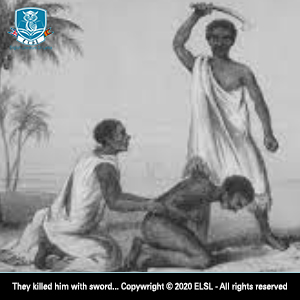
The guards said, ‘Kneel down.’
- The blind faith of the guards who follow the sacrosanct rule of the king is visible.
- Dialogues are yet again present in the stanza to increase the dramatic value of the poem.
- The simplicity of the language style of the guards simulates with that of Kagwa. It further reveals how rivalry is formed among individuals who represent the oppressed party in society through corrupt politics.
They killed him with sword and spear.
- The subservient nature of the guards who blindly follow the orders of the king is elaborated by the poet.
- Death is, of course, too much of a punishment imposed upon Kagwa. He is the mighty hunter who “hunted the lion” after all, and he is not habitually a liar or a deceiver. The unjust treatment he faces, on the one hand, adds emphasis to the overall message of the poem; “Speech is silver, silence is golden.” On the other hand, it sheds light on political corruption and the dangers of involving politics in one’s personal life.
- Kagwa, who perished by “sword and spear”, the same weapon he used to spread his power “through bush and forest,” reminds the reader of the proverb, “live by the sword, die by the sword”.
- The involvement of two different weapons, “sword and spear,” indicates that Kagwa was savagely murdered.
- The powerful huntsman who single-handedly “hunted the lion” surrenders himself without a fight and allows the guards to unjustly murder him.
Then the skull opened its mouth; ‘Huntsman, how did you come here?’
- Third-person objective narration is fused with dialogue again to maintain the dramatic narrative standards of the poem.
- “The skull opened” is a combination of kinesthetic and visual imagery.
- The poet associates supernaturality with the poem with the “talking skull.”
- The question of the skull is a mere repetition of the question asked by Kagwa in stanza one. It clarifies the intended meaning of the word “here” as a state of being.
And the dead man answered, ‘Talking brought me here.’
- The ‘dead man’, Kagwa now talks back indicating the cyclic effect of the moral message of the poem.
- The conclusion makes sense to the reader that the skull too had been another blindly faithful man who did not know where to draw the line between politics and personal life, who talked knowing no limits. It tried to warn Kagwa of the bitter consequences of his wrong judgements which brought him to a tragic death; but Kagwa was too blind and ignorant to understand the advise till it was too late. No sooner there will be another like Kagwa and the cycle of tragedy will continue. The circular narrative style of the poem as well as the repetitive nature of the ignorance of man are further emphasized by the oddly regular rhyming pattern as well as the similar actions which repeat in the first and the last stanzas.
- The poem can be regarded as an allegory due the use of abstract objects, and as the conveyed meaning is understood only at the conclusion of the poem.
Privacy Overview
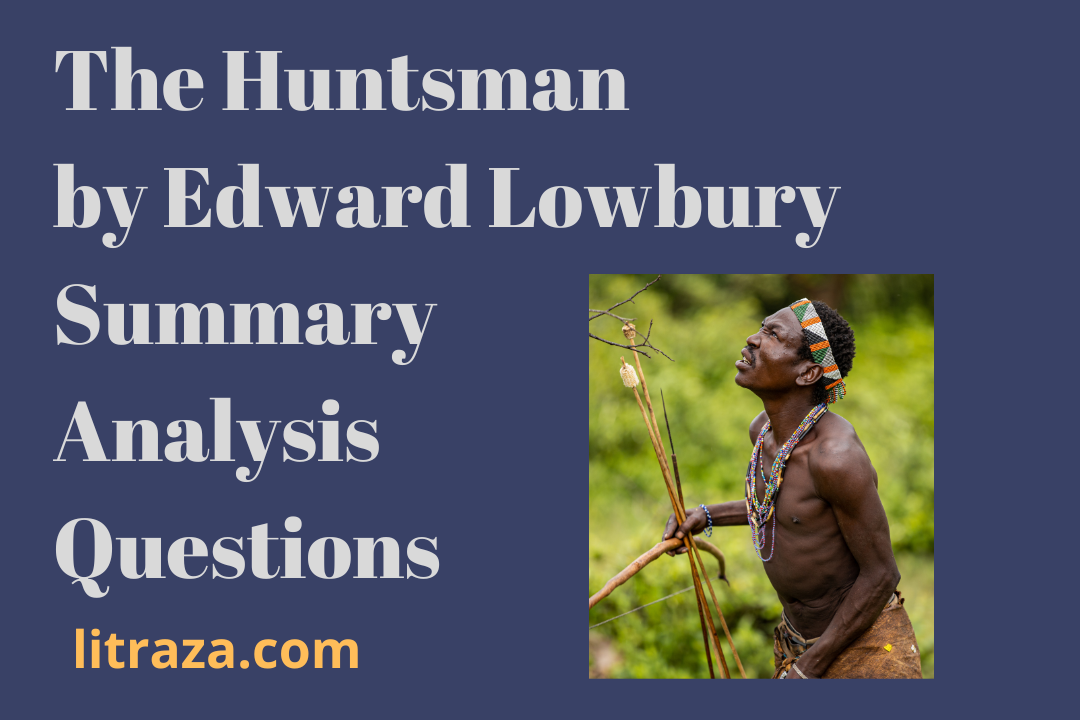
The Huntsman by Edward Lowbury – Summary Analysis Questions
Table of Contents
Introduction
The Huntsman by Edward Lowbury is a poem with a message. It is based on Kenyan folklore. In this poem, the poet advises us to control our emotions and say only what is necessary. He presents the consequences of speaking unnecessarily. The Huntsman by Edward Lowbury is a part of the English syllabi BA/ADA of the Punjab University and the Sargodha University. Therefore, The Huntsman by Edward Lowbury – Summary Analysis Questions is a frequent search on the web. This article, The Huntsman by Edward Lowbury – Summary Analysis Questions, will prove helpful for the students. It will provide them with quality content for the preparation of the examination. This article will help them understand the poet’s line of thought and his approach to the idea he has presented. The Huntsman by Edward Lowbury – Summary Analysis Questions will also assist teachers with its quality content. It will facilitate them in organizing their lectures on this topic.
Edward Lowbury, born on December 6, 1913, had a very productive and eminent career as a poet and a medical practitioner. As a medical practitioner, he worked on hospital infections and founded the Hospital Infection Society. He was also a specialist in burn infections.
Edward Lowbury had as successful a career as a poet as a practitioner. His talent for poetry surfaced at a very young age of ten when he won a prize, Newdigate, for his poetry as an undergraduate at Oxford. He published 14 books of his poetry. His poems reflect his deep insight into human psychology. They also reflect his art of characterization. The Huntsman by Edward Lowbury is an example of his poetic talent. His wife, Alison Young, played an important part in his career as a writer. After she died in 2001, he went blind from glaucoma. He died on July 10, 2007.
The Huntsman by Edward Lowbury Text
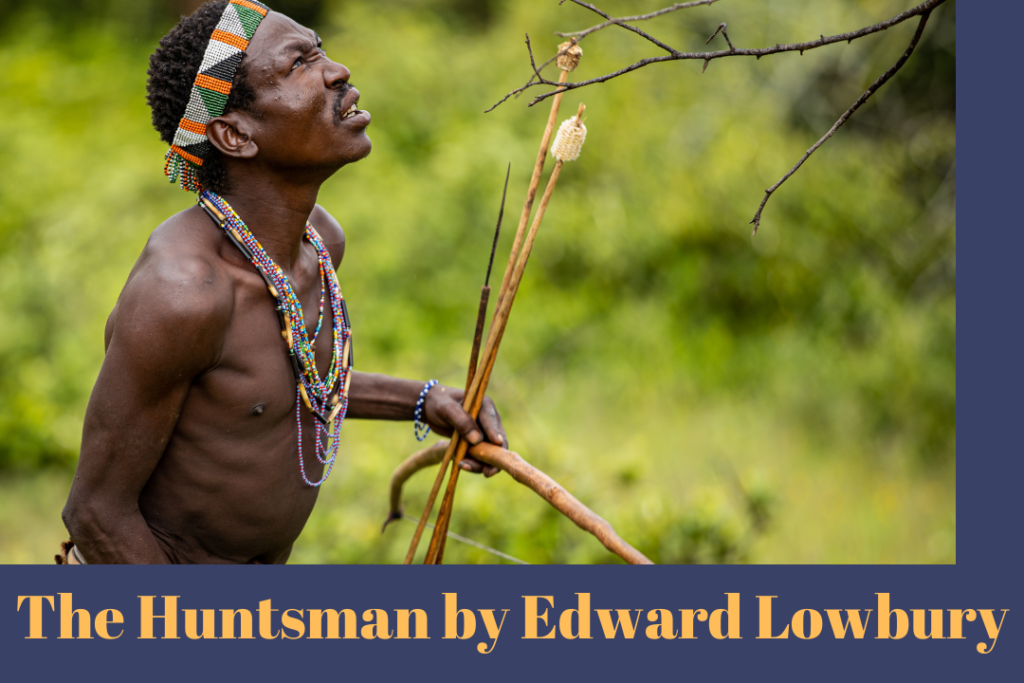
Kagwa hunted the lion,
Through bush and forest went his spear.
One day he found the skull of a man
And said to it, ‘How did you come here?’
The skull opened its mouth and said,
‘Talking brought me here.’
Kagwa hurried home;
Went to the king’s chair and spoke:
‘In the forest, I found a talking skull.’
The king was silent. Then he said slowly,
‘Never since I was born of my mother
Have I seen or heard of a skull which spoke.’
The king called out his guards:
‘Two of you now go with him
And find this talking skull;
But if his tale is a lie
And the skull speaks no word,
This Kagwa himself must die’
They rode into the forest;
For days and nights, they found nothing.
At last, they saw the skull; Kagwa
Said to it, “How did you come here?”
The skull said nothing. Kagwa implored,
But the skull said nothing.
The guards said, ‘Kneel down.’
They killed him with sword and spear.
Then the skull opened its mouth;
‘Huntsman, how did you come here?’
And the dead man answered,
Summary of the Poem The Huntsman by Edward Lowbury
The Huntsman by Edward Lowbury is based on a Kenyan folk tale. The poem teaches us a moral lesson that we should avoid talking unnecessarily. The poet makes good use of irony and suspense. He describes how Kagwa, the Huntsman, becomes the prey of his spear. The fact about the talking skull is full of suspense. The reader remains curious about its response. Kagwa’s end is a fine example of the irony of fate.
Kagwa’s Encounter with the Skull
Kagwa, a brave hunter, used to hunt lions in jungles. Once he found a skull of a man. He asked it humorously how it came there. The skull replied that talking had brought it there. It meant that talking needlessly brought about the death of the man whose skull it was.
Kagwa at the King’s Court
Kagwa, in his nervousness and fear, could not understand the underlying message in the words of the skull. He was so excited that he could not keep the knowledge about the talking skull to himself. He desired to share this information and the most suitable person he found for it was the King. So, he rushed to the King’s court and told the King about the talking skull.
The King’s Response to Kagwa’s Claim
The king said that ever since his birth, he had never heard of a skull that spoke. However, he appointed two guards to accompany Kagwa and find the talking skull. He also ordered them to kill Kagwa immediately if the skull spoke nothing.

Kagwa’s Death – Irony of Fate
Kagwa and the guards looked for the skull for many days and nights. Finally, they found it. Kagwa asked the skull how it came there. The skull spoke nothing. He implored repeatedly, but in vain. The guard beheaded Kagwa there and then. Now the skull asked Kagwa how he came there. “Talking brought me here”, was Kagwa’s reply.
The Huntsman by Edward Lowbury – Important Questions
Q1: what are the elements of irony and satire in the poem, the huntsman by edward lowbury, q2: what is the message/lesson of the poem, the huntsman by edward lowbury.
The Huntsman by Edward Lowbury presents a fine example of irony and satire. Before we trace out the elements of irony and satire in this poem, it would be beneficial if we could see what they mean.
Irony is a literary device that facilitates the writer to convey his message through contradictory references. These contradictory references may occur in language, character, or situation. There are multiple layers of the message. One needs a profound observation to understand an ironic remark, situation, or personality. Consequently, the reader has to undergo a proper mental exercise to reach the real meaning.
Through satire, the writer focuses on exposing or deriding the absurdity or folly of a character, institution, or society as a whole.
Coming back to our topic, in The Huntsman by Edward Lowbury, we find the poet employs both of these to ridicule Kagwa. While ridiculing Kagwa, the poet also imparts a moral lesson.
Irony in The Huntsman by Edward Lowbury
Kagwa’s first encounter with the talking skull.
There are two types of irony in this poem. Firstly, the poet employs verbal irony. Kagwa who is a brave hunter finds a skull in the jungle. He asks the skull how it came there. The skull opens its mouth and tells Kagwa: ‘Talking brought me here.’ It is surprising for Kagwa to find a skull that speaks. In his excitement and fear, he does not pay attention to the underlying message in these words.
Kagwa’s Claim and the King’s Response
Secondly, there is situational irony. Kagwa rushes to the King’s court and without any understanding of the situation tell the King about the talking skull. He aims to win the King’s appreciation. But he misjudges the situation. The King is not impressed with his description of the talking skull. Instead, he appoints his guards to accompany Kagwa and find the talking skull. The most ironic part is that the King orders his guards to kill Kagwa at once if he fails to prove his claim. The situational irony reaches its climax when Kagwa and the guards find the skull. Kagwa asks it repeatedly how it came there, but the skull says nothing.
Kagwa’s End – Irony of Fate
Finally, Kagwa’s habit of speaking needlessly impels Kagwa to the irony of fate. In the end, the guards ask Kagwa to kneel. They behead Kagwa on the spot. Now, the skull ironically asks Kagwa how he came there, and Kagwa replies: ‘Talking brought me here.’
Satire in The Huntsman by Edward Lowbury
By the use of irony, Edward Lowbury hurls satire on the likes of Kagwa who are in the habit of speaking unnecessarily. The poet accentuates that one should control one’s emotions and analyze the situation before making tall claims. Furthermore, it is not necessary that others may also believe what you say. Also, this habit of speaking unnecessarily may cause serious damage as in the case of Kagwa. It is also the message or lesson of this poem that one should be very careful with his words.
Click for a high-quality article on Patriot into Traitor by Robert Browning .
Related Posts

Woman Work by Maya Angelou – Summary Analysis and Questions

Online Education – Advantages and Disadvantages
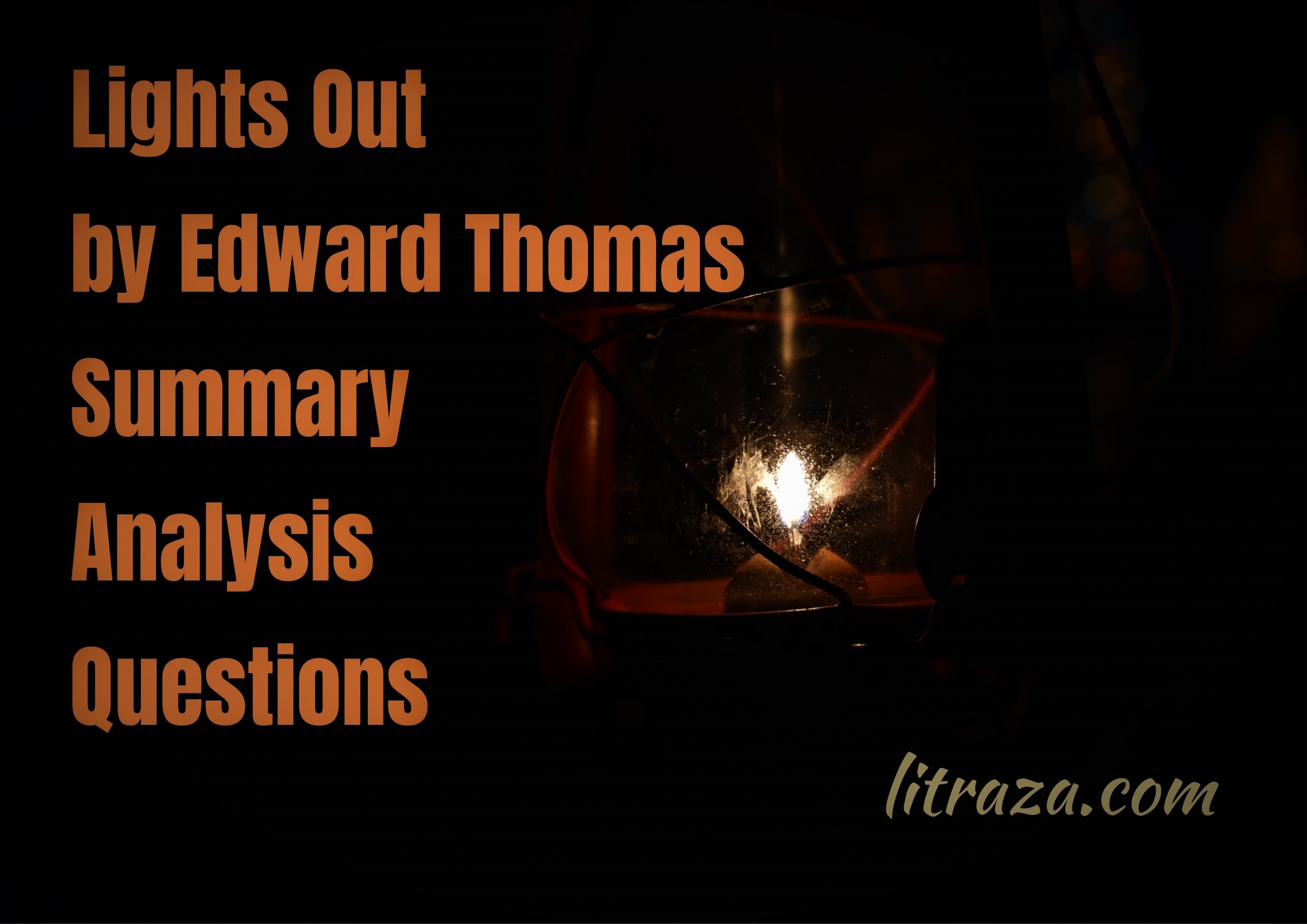
Lights Out by Edward Thomas – Summary Analysis Questions
[…] Here is an important article for you on The Huntsman by Edward Lowbury. […]
Leave a Reply Cancel reply
Your email address will not be published. Required fields are marked *
Save my name, email, and website in this browser for the next time I comment.

The Huntsman Poem by Edward Lowbury Summary, Notes and Line by Line Explanation in English for Students
Table of Contents
Introduction:
The poem “ The Huntsman ” is a ballad written by Edward Lowbury. The poem is based on Kenyan Folklore. He heard this story while he was posted to Kenya. The main theme behind the poem is “Talking without prior thinking can result in tragedy”.
About the Poet:
Edward Lowbury is an English pathologist, poet, author and educator. He was born in 1913. Lowbury has published seven collections of works. His writing style is lyrical. He uses plain and concise language in his writings.
The poem “The Huntsman” is a ballad. The term “Ballad” refers to a poem with musical quality. It is narrative in nature ie it narrates a story. Mostly ballads are written in the form of ABAB rhyme scheme. The poem “The Huntsman” consists of 5 stanzas.Each stanza has 6 lines each.
Each line consists of five to seven words on average. The poet has used spacing and line breaks to emphasise the incidents taking place in the poem. But, the poet has not followed a certain metric form. It is written with an iambic metre with variations on the number.
Point of view:
The poem “The Huntsman” is written from a third person point of view. It tells about the story of Kagwa, a huntsman in this poem.
The poem “The Huntsman” is an African Ballad by Edward Lowbury. Kagwa is the main character of the poem. Kagwa, a huntsman, one day finds a talking skull. With excitement he runs to the King and informs about the talking skull. The king doesn’t believe this story. So, he sends two guards along with Kagwa to find the talking skull. But, he has ordered the guards to kill Kagwa, if they cannot find the talking skull. After travelling for a long time, Kagwa asks the skull to speak. But, the skull remains quiet which results in the death of Kagwa. After Kagwa dies, the skull opens its mouth and asks the same question which was earlier asked by Kagwa to the skull “Huntsman how did you come here”. To which Kagwa replies the same answer of the skull “Talking brought me here”.
Poem Analysis:
The poet begins the poem with the introduction of a character named “Kagwa”. He is a hunter. One day after hunting a lion, he found the skull of a man in the forest. To pass his time, he asked how he came to the place. Surprisingly, the skull opened its mouth and answered “Talking brought me here”.
Lines 7-12:
With mixed emotions, Kagwa hurried to his home. He couldn’t control his mind. So, he went to the king and informed about the talking skull in the forest. The king listened to the story slowly and told, he has never seen or heard of a speaking skull in his life.
Lines 13-18:
The king didn’t believe the story of the huntsman. To verify the story he calls his two guards to go along with Kangwa. He orders them to find the talking skull. If the skull speaks no words then he orders the guards to kill Kagwa.
Lines 19-24:
Kagwa along with the guards started their journey to the forest. The trip was long, it took days and nights to reach the place. Kagwa found the skull, and asked the same question “How did you come here?”. The skull said nothing. Kagwa pleaded with the skull, but the skull remained quiet.
Lines 25-30:
Now, the guards have to do their duty. So, they made Kagwa kneel down. Soon, they killed him with a sword and spear.As soon Kagwa dies, the skull opens its mouth and asks Kagwa “Huntsman, how did you come here?”. Now the dead Kagwa answered “Talking brought me here”.
Related Posts:
- English Summary Home
- Random Phrase Generator [English]
- Stri Purush Tulana by Tarabai Shinde Analysis
- Mirza Ghalib Shayari on God
- Random Job Generator [List]
- English Summary • English Notes on Poetry, Prose, Fiction, Drama, Grammar, Essays Summaries
- _G.C.E.(A/L) Past Papers
- _G.C.E. (O/L) Past Papers
- _Presentations
- _Worksheets
- E-book Store
- _Litspring Community
The Poem ‘The Huntsman’ by Edward Lowbury as a Reflection of Common Human Weaknesses

The poem The Huntsman is a humorous poem which discusses about human weaknesses written by Edward Lowbury. Discuss this statement in relation to the poem.
Answer of Dinethya
The Huntsman is a very interesting poem which is written by Edward Lawbury. By this poem poet describes about certain major human weaknesses. This reveals about a hunter called Kagwa and his unbelievable experience.
There are many human weaknesses inside any human. Excessive talking is a massive human weakness. This poem tells of the bad result caused by excessive talking. Excessive worthless talking brings destruction. This message is very common but how many people would listen to this advice is the issue. In the poem, when Kagwa was hunting in the forest, he found a skull of a man:
“one day he found a skull of a man, and said to it, ‘how did you come here?’
It is obvious that anyone knows that dead skull cannot talk or have a conversation. However, the skull discovered by Kagwa can speak. Knowing that the skull can speak, he starts a conversation with the skull. It is clear that this is a kind of an unnecessary talking. The poet may depict the result caused by unnecessary talking with an unsuitable thing or a person at the beginning of the poem.
The old generation advised to think twice before speaking; because once spoken, the words cannot be withdrawn into the mouth again. As seen in the poem, Kagwa brings that news to the king in the palace to get a prize by revealing his discovery. The king replies:
“Never since I was born of my mother Have I seen or heard of a skull which spoke.’
Kagwa was too affected by the vary weakness of human. He immediately brings the news into the king’s ears without thinking about the consequences of the unbelievable story he relates. Edward Lawbury depicts the negative results arise by such human weakness.
The king could not believe the news Kagwa related. From there, the negative consequences arise merely because of a common human weakness. Kagwa has put his life into danger for falling into a weak human quality. The king sends Kagwa with the guards to find about the skull imposing a condition:
“But if his tale is a lie, And the skull speaks no word This Kagwa himself must die.”
After a tiresome journey, they found the skull. However, ‘The skull said nothing, Kagwa implored.” When Kagwa asked the question from the skull, it says nothing. He must have understood the advice and warning given by the skull by then. In this point, the poet, Lowbury might be trying to highlight the advice to think twice before act. Not doing so is a common human mistake. The repeated humorous ending might suggest that:
“Then the skull opened its mouth; ‘Huntsman, how did you come here?’ And the dead man answered, ‘Talking brought me here.’
After facing the consequences of excessive and worthless talking, the poet comes up with moral message using grim irony. Had Kagwa thought what the skull said initially, he would have not faced such a fate. Overall, Edward Lowbury highlights the golden message ‘speech is silver, silence is golden;’ not following that is a common human weakness.
Answer of Ishra
The huntsman by Edward Lowbury is a humorous poem which discusses about human weaknesses. The poet gives a great advice to the society through the poem. The poet at first gives an image of a brave hunter: “Kagwa hunted the lion/Through bush and forest went his spear.” This shows his bravery but one day on his usual tour of hunting, he found something unusual:
“One day he found the skull of a man And said to it, ‘how did you come here?’ The skull opened its mouth and said ‘talking brought me here.”
The above extract clearly explains a human weakness. Even though Kagwa, the huntsman is a brave person, but it seems like he is ignorant. The fact is that usually a dead person never speaks nor a skull can speak. However, this huntsman was foolish enough to speak to the skull. Being ignorant is one of the human weaknesses mentioned in the poem.
After the incident of speaking with a skull, Kagwa was excited and he quickly went to the king’s chair and informed the king. Kagwa might have thought that, in hearing the story he would get a reward:
“Kagwa hurried home; Went to the king’s chair and spoke: ‘In the forest I found a talking skull.’
Through the above extract, the poet gives an idea that before speaking or doing something, you have to think twice about it. The saying: ‘think twice before you act.’ suits to the above extract of the poem. Here the poet shows the main human weakness, being quick and not thinking twice before doing something. As well as taking quick decisions might lead to hazardous situations:
“…find this talking skull; But if his tale is a lie And the skull speaks no word, This Kagwa himself must die.”
The above extract gives the outcome of the quick decision taken by the huntsman. Finally, if the skull did not speak a word, he would have to sacrifice his life.
“At last they saw the skull; Kagwa Said to it ‘how did you come here?’ The skull said nothing. Kagwa implored,”
The above extract show that what Kagwa saw and heard was a hint given to him but he failed to understand the hint.Taking quick decisions ended with a hazardous situation and Kagwa lost his life. Soon after guards left:
“…the skull opened its mouth; ‘Huntsman how did you come here?’ And the dead man replied, ‘Talking brought me here.”
The hint given by the skull was not to speak before thinking but as huntsman failed to understand this he too got into the same trouble that the skull had faced.
The moral of this poem is to think twice before you speak. No one is perfect even the bravest person who hunted a lion had to die because of a funny story of a skull which spoke. Even though the poem ‘the huntsman’ by Edward Lowbury is a humorous poem, it depicts about human weaknesses and gives great advices to the society.
What are your ideas about their answers? Please let us know by leaving a comment in the comment section. Share the post to let other students to read and collect useful insights about the short story.

You may like these posts
Post a comment.

thanks a lot
This helped me a lot sir and lm going to share this with my firends .thank you
Get new posts by email:
- B.A. Ja'pura 10
- Drama Scripts 4
- G.C.E (A/L) Literature 56
- G.C.E (O/L) Literature 75
- Students' Corner 7
Visit Us on Social Media
Featured post.

Top 08 Quotations in the Extract ‘Wave’ by Sonali Deraniyagala
These quotations are extracted from the extract prescribed for G.C.E. Ordinary lev…
Total Pageviews
- Watch us on YouTube
Weekly Popular

Big Match by Yasmine Gooneratne Explained

Analysis of War is Kind by Stephen Crane

Analysis of Farewell to Barn and Stack and Tree by A.E. Housman

Summary of the Play Twilight of a Crane by Junji Kinoshita
Menu footer widget.
- Privacy Policy

The Summary, Theme, and central idea of the Poem The Huntsman by Edward Lowbury

The Huntsman (Edward Lowbury)
What ideas are presented in the poem “the huntsman”, reference to the context, you can also read.
- Share on Facebook
- Share on Twitter
I am a published author of dozens of books in Pakistan. I have been Editor of The Guide in National University of Modern Languages Islamabad (NUML). I am MPhil in Applied Languistics from University of the Lahore. Being an M.Ed I mostly spend my time training the teachers.
Post a Comment
Contact form.
English Literature
Literature is the most agreeable way of ignoring life.
The Huntsman

21 comments:

Very nice analysis!
What is this there the sentencesame are overly repeated yet thankyou
Why the sentences are repeated? But still it was nice to read Thanks
Why did you repeat the sentences? but they are apperantly good. Well done. It's fab.
Good. I like this a lot.
Very good analysis but sentences are repeated... Great job...
eventhough its repeated its vividly clear about the fact humour, in the poem
Thank you nice analysis
This comment has been removed by the author.
It is a nice analysis thank you! 👍
realy helpfull
really helpful for the my studies Thanks a lot
good job... it was very useful in my academic stuff though the sentences are repeated .thank u
Thanks a lot for this nice analysis
tnx very much. this was very very useful to me to write a literature essay type answer
Thanks very much 👍
Thank you very much
Very nice analysis
ඉංග්රීසි සාහිත්යය (නව නිර්දේශය)
Poetry- huntsman - 2 (kandurata guru gedara radio lessons series).
- Unit Question Papers
Stay in touch
- https://e-thaksalawalms.moe.gov.lk/
- Hot Line :- 1916
- [email protected]
Finished Papers
Write an essay from varied domains with us!
Rebecca Geach
Dr.Jeffrey (PhD)
Essay writing help has this amazing ability to save a student’s evening. For example, instead of sitting at home or in a college library the whole evening through, you can buy an essay instead, which takes less than one minute, and save an evening or more. A top grade for homework will come as a pleasant bonus! Here’s what you have to do to have a new 100% custom essay written for you by an expert.
To get the online essay writing service, you have to first provide us with the details regarding your research paper. So visit the order form and tell us a paper type, academic level, subject, topic, number and names of sources, as well as the deadline. Also, don’t forget to select additional services designed to improve your online customer experience with our essay platform.
Once all the form fields are filled, submit the order form that will redirect you to a secure checkout page. See if all the order details were entered correctly and make a payment. Just as payment is through, your mission is complete. The rest is on us!
Enjoy your time, while an online essay writer will be doing your homework. When the deadline comes, you’ll get a notification that your order is complete. Log in to your Customer Area on our site and download the file with your essay. Simply enter your name on the title page on any text editor and you’re good to hand it in. If you need revisions, activate a free 14-30-day revision period. We’ll revise the work and do our best to meet your requirements this time.

Customer Reviews
The shortest time frame in which our writers can complete your order is 6 hours. Length and the complexity of your "write my essay" order are determining factors. If you have a lengthy task, place your order in advance + you get a discount!

Finished Papers
Sophia Melo Gomes
- History Category
- Psychology Category
- Informative Category
- Analysis Category
- Business Category
- Economics Category
- Health Category
- Literature Category
- Review Category
- Sociology Category
- Technology Category

How will you prove that the drafts are original and unique?
Jalan Zamrud Raya Ruko Permata Puri 1 Blok L1 No. 10, Kecamatan Cimanggis, Kota Depok, Jawa Barat 16452
Finished Papers

IMAGES
VIDEO
COMMENTS
In the last part of his career, Lowbury had delivered many lectures on literary themes to learned societies; these were finally collected, along with a few essays, in Hallmarks of Poetry (University of Salzburg, 1994). He died in 2007. Main Idea | Theme of Poem | The Huntsman. The Huntsman is an interesting poem based on African folklore.It is a story of a huntsman Kagwa.
Edward Lowbury's "The Huntsman" is a ballad based on an African folktale. It follows the story of a huntsman named Kagwa who finds a talking skull and eventually ends up turning into one. Lowbury's poems are known for their characteristic mystique and storytelling. The theme of this poem is "talking"- to be done when necessary and ...
The Huntsman. The poem is based on a Kenyan folk tale, and the poet adds significance to the subject, the huntsman with the usage of the definite article [The] ... it elevates the dramatic quality and the timelessness associated with the context of the poem. Note: Even though there is no answer provided to the question asked by Kagwa, it is ...
Model Answer by RCF on the poem Huntsman - Free download as Word Doc (.doc / .docx), PDF File (.pdf), Text File (.txt) or read online for free. This Model essay about the poem Huntsman will give you some idea about how to answer an essay type question on poetry according to the marking scheme. For more model answers, visit my website www.lithelp.yolasite.com
September 12, 2020. "The Huntsman" has been composed by the modern English poet Edward Lowbury. It is based on an African folklore which explains the uncertainty of human life. The poem is an evidence of imaginative richness and psychological insight of the poet. It is also full of suspense mystery and supernatural.
Introduction. The Huntsman by Edward Lowbury is a poem with a message. It is based on Kenyan folklore. In this poem, the poet advises us to control our emotions and say only what is necessary. He presents the consequences of speaking unnecessarily. The Huntsman by Edward Lowbury is a part of the English syllabi BA/ADA of the Punjab University ...
The poem "The Huntsman" is a ballad. The term "Ballad" refers to a poem with musical quality. It is narrative in nature ie it narrates a story. Mostly ballads are written in the form of ABAB rhyme scheme. The poem "The Huntsman" consists of 5 stanzas.Each stanza has 6 lines each.
Huntsman is a beautiful lesson based poem by Edward Lowbury. This poem teaches us how being silent sometimes is better than speaking even if it is about trut...
Disclaimer: Please note no copyright infringement is intended, and I do not own nor claim to own any of the background music played in this video.Copyright: ...
From these model answers, you will learn how to answer an essay type question according to the marking scheme.) Await model answers on the dramas next. The poem, 'The Huntsman' which is based on a Kenyan folk story is a narrative poem about a huntsman called Kagwa and his death penalty he receives due to his over-talking.
Find suitable quotations from the poem. a. Kagwa seems to be a brave huntsman. b. The talking skull has already told him about the reason for the death. ... Write the literary techniques used by the poet in the poem "The Huntsman". 05. Answer the context questions. 1. 'Never since I was born of my mother Have I seen or heard of a skull ...
Answer of Dinethya. The Huntsman is a very interesting poem which is written by Edward Lawbury. By this poem poet describes about certain major human weaknesses. This reveals about a hunter called Kagwa and his unbelievable experience. There are many human weaknesses inside any human. Excessive talking is a massive human weakness.
Huntsman - Free download as PDF File (.pdf), Text File (.txt) or read online for free. the huntsman poem
The poem The Huntsman is based on African folklore which describes the tragic uncertainty of life in Africa. The poem is based on folklore that is full of the experience of practical life and wisdom. The poet narrates the story of his own tragedy. He is the hunter of the lions, but by a stroke of luck, he becomes the prey.
The Huntsman. The poem 'The Huntsman' was written by Edward Lawbury comes under the theme humor. He uses the elements of irony and suspense to bring about humor in the poem. They simply help to depict the unthinking childish behavior of the hunter.The humorous poem has been written by the poets in order to make the reader laugh.
POEM 7 the huntsman tayyab - Free download as PDF File (.pdf), Text File (.txt) or read online for free. BA ENGLISH POEM 7 THE HUNTSMAN
Summary. In this sonnet, titled 'Amoretti LXVII: Like as a Huntsman,' Edmund Spenser draws a parallel between a huntsman and his pursuit of prey and his own pursuit of love. The poem explores themes of desire, perseverance, and the surprising nature of love. The huntsman, exhausted from his fruitless chase, finds respite in a shady spot ...
Poetry- Huntsman - 1 (Kandurata Guru gedara Radio Lessons Series) Jump to... Home; Calendar; Course sections ...
Huntsman Poem Essay Answer - Margurite J. Perez #13 in Global Rating Great! I am on it. Recent Review About this Writer. Nursing Management Business and Economics Psychology +113. User ID: 108261. ID 19673. Huntsman Poem Essay Answer: Hire a Writer. Please note. All our papers are written from scratch. ...
Huntsman Poem Essay Answer. Ying Tsai. #3 in Global Rating. Check your email for notifications. Once your essay is complete, double-check it to see if it falls under your expectations and if satisfied-release the funds to your writer. Keep in mind that our essay writing service has a free revisions policy. Hire a Writer.
Offered free alterations and asked if I want them to fix something. However, everything looked perfect to me. Recent Review About this Writer. 675. Finished Papers. (415) 397-1966. NursingManagementBusiness and EconomicsPsychology+99. 2646. Customer Reviews.
Liberal Arts and Humanities. Research papers can be complex, so best to give our essay writing service a bit more time on this one. Luckily, a longer paper means you get a bigger discount! Hire a Writer. ID 9011. Bennie Hawra. #29 in Global Rating. Essay, Coursework, Research paper, Discussion Board Post, Questions-Answers, Term paper, Case ...